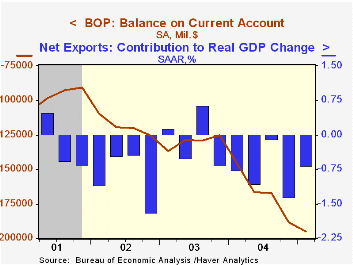 Global| Jun 17 2005
Global| Jun 17 2005U.S. Current Account Deficit Another Record
by:Tom Moeller
|in:Economy in Brief
Summary
The 1Q05 US current account deficit deepened to another record of $195.1B, or 6.4% of GDP. Consensus expectations had been for a deficit of $189.0B. Trade account deterioration was estimated to have subtracted 0.7 percentage points [...]

The 1Q05 US current account deficit deepened to another record of $195.1B, or 6.4% of GDP. Consensus expectations had been for a deficit of $189.0B. Trade account deterioration was estimated to have subtracted 0.7 percentage points from 1Q growth in real GDP, an estimate which may be increased. Earlier estimates of the current account deficit were deepened slightly for 2004.
The deficit in merchandise trade deteriorated to $186.3B from a revised $182.2B in 4Q. Exports grew 2.4% (10.3% y/y) and imports rose 2.3% (15.9% y/y).
The surplus on services improved for the second consecutive quarter to $14.6B, the highest level since 4Q03 but remained down from the annual peak in 1997 of $89.8B. Exports of services grew 4.3% in 1Q (12.7% y/y and imports rose 2.9% (12.1% y/y).
From the capital account, US foreign direct investment abroad dropped sharply to $32.2B following a 4Q surge while foreign direct investment in the US slipped to $28.8B.
| US Int'l Balance of Payments | 1Q '05 | 4Q '04 | Y/Y | 2004 | 2003 | 2002 |
|---|---|---|---|---|---|---|
| Current Account Deficit | $195.1B | $188.4B | $146.1B | $668.1B | $519.7B | $475.2B |
| Goods/Services/Income Deficit | $168.0B | $166.0B | $123.8B | $587.1B | $448.5B | $411.2B |
| Exports | 2.1% | 5.0% | 13.8% | 14.9% | 6.8% | -3.7% |
| Imports | 1.9% | 6.3% | 19.4% | 18.1% | 7.3% | 1.6% |
| Unilateral Transfers Deficit | $27.1B | $22.4B | $22.3B | $80.9B | $71.2B | $64.0B |
Tom Moeller
AuthorMore in Author Profile »Prior to joining Haver Analytics in 2000, Mr. Moeller worked as the Economist at Chancellor Capital Management from 1985 to 1999. There, he developed comprehensive economic forecasts and interpreted economic data for equity and fixed income portfolio managers. Also at Chancellor, Mr. Moeller worked as an equity analyst and was responsible for researching and rating companies in the economically sensitive automobile and housing industries for investment in Chancellor’s equity portfolio. Prior to joining Chancellor, Mr. Moeller was an Economist at Citibank from 1979 to 1984. He also analyzed pricing behavior in the metals industry for the Council on Wage and Price Stability in Washington, D.C. In 1999, Mr. Moeller received the award for most accurate forecast from the Forecasters' Club of New York. From 1990 to 1992 he was President of the New York Association for Business Economists. Mr. Moeller earned an M.B.A. in Finance from Fordham University, where he graduated in 1987. He holds a Bachelor of Arts in Economics from George Washington University.
More Economy in Brief
 Global| Feb 05 2026
Global| Feb 05 2026Charts of the Week: Balanced Policy, Resilient Data and AI Narratives
by:Andrew Cates






